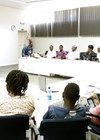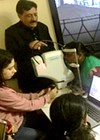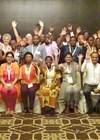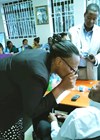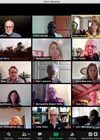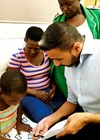Humanitarian
DR-NET National DR Workshop in Tanzania: Policy, training and technology
Diabetic retinopathy (DR) is a leading cause of moderate to severe visual impairment (VI) and blindness worldwide, posing a significant public health challenge. As the prevalence of diabetes continues to rise globally, particularly in low- and middle-income countries (LMICs), the...
Building capacity in eye health: A story of partnerships and collaborations
In the evolving landscape of global eye health, partnerships and collaborations have been instrumental in driving capacity building and professional development. The impact of strategic alliances like VISION 2020 LINKS and the Diabetic Retinopathy Network (DR-NET) cannot be overstated, as...
Implementing technology to improve global eye health
Technological innovation is providing new solutions to transform global eye health [1–5]. In particular, research towards the development of artificial intelligence (AI) tools in ophthalmology has gained pace in recent years. However, there has been little research relating to its...
Help the VISION 2020 LINKS & Networks Programme to save children’s sight and lives
The LINKS & Networks Programme was established at the International Centre for Eye Health (ICEH), London School of Health and Tropical Medicine (LSHTM), 20 years ago to improve the quality and quantity of eye health services in low- and middle-income...
Preventing blindness from diabetes: planning a programme of service development and research across Malawi
In sub-Saharan Africa 19.4 million people have diabetes; this is projected to rise to 28.6 million by 2030 [1]. Sight loss from diabetes devastates the lives of working people, affecting the financial stability of the families and communities who depend...
Developing a training model to strengthen diabetic retinopathy screening through a VISION 2020 LINK in India
I. Development of LINK Partnership A VISION 2020 LINK India was established by signing a Memorandum of Understanding (MoU) in 2018 between the Post Graduate Institute of Medical Education and Research (PGIMER), Chandigarh, India, Frimley Health NHS Foundation Trust and...
DR-NET Workshop – information-sharing for strengthening DR programmes
Contributors: Rosie Brennan, Anshul Chauhan, Mona Duggal, John Ellis, Michael Gichangi, Edwin Grayson, Catherine Jamieson, Ankita Kankaria, Oliver Kemp, Hendra Kusuma, Nanda Matthew, Geeta Menon, Habibah Muhiddin, Tunde Peto, Recivall Salongcay, Frank Sandi, Hazel Shillingford-Ricketts, Bernadetha Shilio, Caroline Styles, Sharon...
Development of retinoblastoma care in Indonesia and the role of multidisciplinary team meetings
In the second article of a two-part series (See Part 1 here), the authors focus on the diagnosis and management of retinoblastoma in Indonesia. COVID-19 doesn’t get thanked for many things, but on 19 December 2020 as the world grew...
The Diabetic Eye Screening Programme in Tanzania - The VISION 2020 LINK between Dodoma and Belfast
Rahila Bashir, Senior Remote Ophthalmic Research Image Grader, talks to Frank Sandi, Ophthalmologist at the Benjamin Mkapa Hospital (BMH), University of Dodoma in Tanzania and to Tunde Peto at Queen’s University Belfast (QUB) and Belfast Health and Social Care Trust...
VISION 2020 LINKS Programme and DR-NET World Sight Day Workshop
World Sight Day (WSD) was celebrated globally on 8 October 2020 [1]. From Australia and the Pacific to the Americas, via Asia, Africa and the Caribbean, awareness-raising and advocacy activities took place throughout the day, to focus attention on unnecessary...
6.6.2020 – a celebration of international partnerships
The date 6.6.2020 was selected as a significant milestone for celebrating the achievements of the VISION LINKS Programme as part of the global ‘VISION 2020: The Right to Sight’ initiative [1]. This virtual full-day seminar included LINK partners in the...
Development of retinoblastoma services in Zimbabwe
Zimbabwe recognised the need for a paediatric ophthalmology service almost 20 years ago. The economic uncertainty in the country made it difficult to secure financial support, so initial funding came through local donors. Equipment – including vision charts, ophthalmoscopes and...






